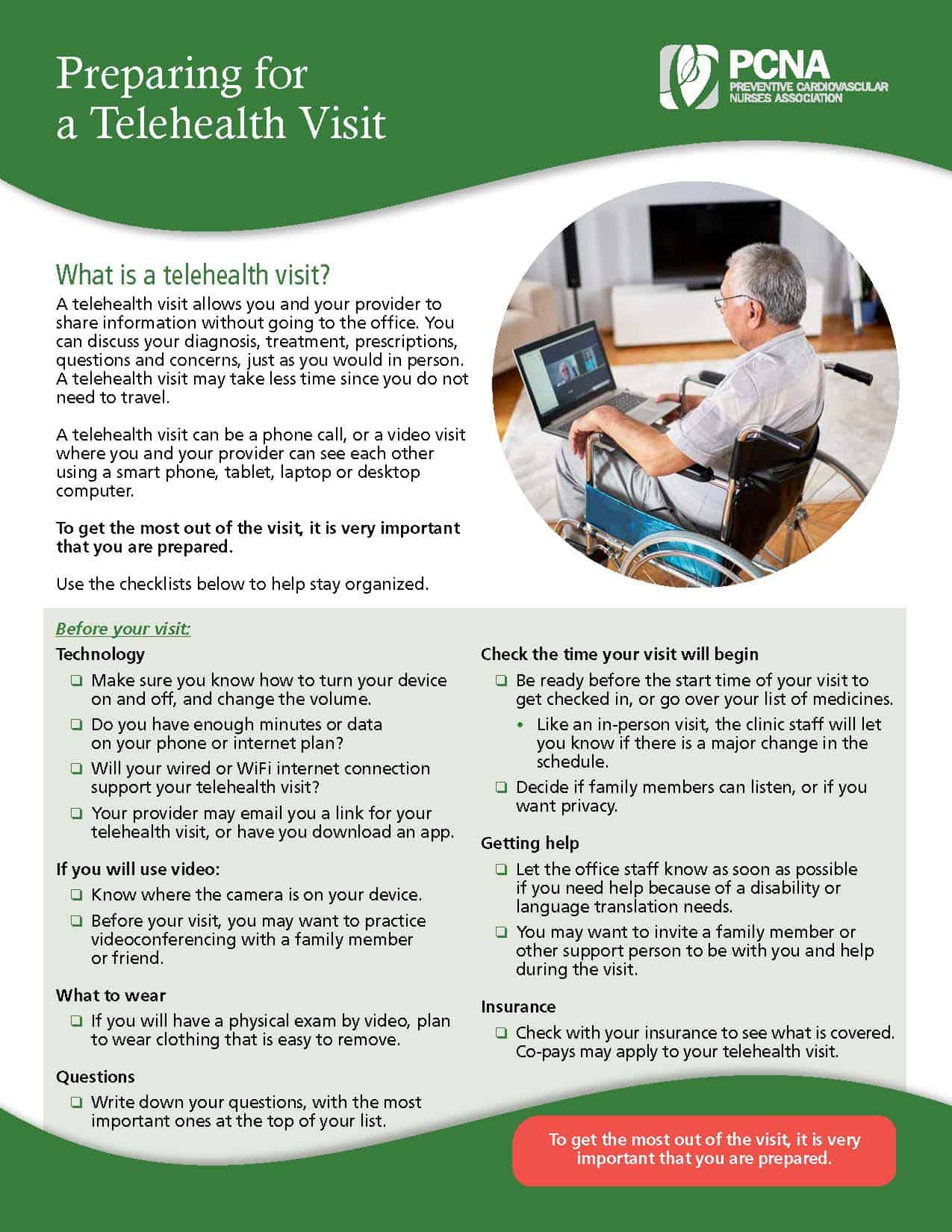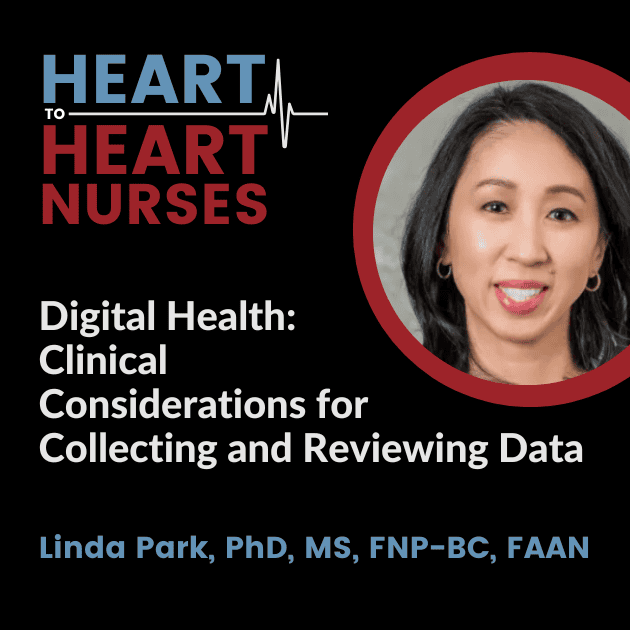The umbrella term ‘digital health’ encompasses eHealth, mHealth, telehealth and more. How do we leverage the power of digital health for all patients and ensure that the collected data is utilized? Guest: Linda Park, PhD, MS, FNP-BC, FAAN, FAHA, FPCNA
Welcome to Heart to Heart Nurses, brought to you by the Preventive Cardiovascular Nurses Association. PCNA’s mission is to promote nurses as leaders in cardiovascular disease prevention and management.
Geralyn Warfield (host): I’d like to welcome our audience today to our conversation with Linda Park. Linda, could you introduce yourself to our audience?
Linda Park (guest): Sure. Hi, Geralyn. I am an Associate Professor in the School of Nursing at University of California San Francisco. I also hold a position in the San Francisco VA as a Research Health Science Specialist.
And I also practice as a Nurse practitioner in hospital-based cardiology cath lab area at John Muir Medical Center in Concord, California.
Geralyn Warfield (host): Well, we’re so glad that you have joined us today. And our conversation’s going to center around digital health for cardiovascular disease. So, I’m going to go ahead and turn it over to you and let you kind of tell us what you think is [00:01:00] most important in that particular part of our field.
Linda Park (guest): Yeah. Well, I’ll just say that digital health spans, lots of things. So, it’s really an umbrella term for what we previously called eHealth, mHealth, telehealth. It is kind of is an umbrella term, so I’m going to speak a bit broadly today.
But it captures all the different technologies that are patient-facing, provider-facing, and also the backend of what happens to integrate technology with patient care, analytics, all that.
So, it’s a huge space. It also includes AI, which is also, you know, a hot topic and you know, hopefully will change the world in good ways, health information systems. So, I just wanted to talk about it today in the context of maybe patient and provider only, because capturing everything is probably a bit [00:02:00] too overwhelming.
Geralyn Warfield (host): That sounds like a very excellent plan. Why don’t you start our conversation talking a little bit about patient-facing pieces?
Linda Park (guest): Sure. So, I’ll just talk in the context of working as a provider in the cath lab space and, you know, patients coming in with their AFib ablations because they captured an arrhythmia on their smart watch, that kind of thing.
So, there are these patient-facing technologies that are really helpful for patients to monitor their health. If they had some palpitations, they get a smart watch, that kind of thing.
Digital health also helps when you are capturing your step counts, you know, as simple as that. And we all do that whether we want to or not, by carrying our cell phones with us. So, all of these technologies, I think, they help us in lots of monitoring, you know, capturing data ways that are seamless and, you know, we don’t have to [00:03:00] press anything, or it just kind of does it in the background.
And then there’s also these sensors that we wear. And so, we put these implantable loop recorders that monitor your rhythm that is otherwise hard to capture.
We have these, you know, skin patch technologies—there’s a very fun, evolving field.
However, I think the concern is being able to provide it for all people, all populations, all communities. And the concern in being, you know, who are we leaving behind in offering these really high-tech technologies. But people who maybe live in rural communities or who don’t have other ways to access health.
You know, it feels like that divide is getting bigger and bigger. Just a simple idea of having Wi-Fi and having access. You know, some patients [00:04:00] that I enroll into my clinical trials say have to go to libraries and community centers to get access to Wi-Fi. So, we can’t necessarily expect them to be able to capture data remotely because they don’t have that. We have to offer them a MiFI [mobile hotspot], that kind of thing.
So, yeah, a lot of potential there, but also some concern that we are also, you know, widening that divide that’s already here.
Geralyn Warfield (host): We’re going to take a quick break and we will be right back.
Geralyn Warfield (host): We’re back for more discussion with Linda Park. And Linda, right before our break, you were talking about what the benefits are from the patient side, but I’m hoping you could address what it’s like from the professional side to have this mobile e-health, telehealth, all of these kinds of opportunities to connect with, and get information from, our patients.
Linda Park (guest): Sure. Yeah. I think, given the potential of digital health, you know, we’ve seen it really realized in remote patient [00:05:00] monitoring that kind of space. But I think the day-to-day, outpatient encounter, we sometimes don’t know what to do with those data. It’s so hard to squeeze in all that you need to squeeze in, into, you know, your 10-minute visit and then the 5-minute charting. Everything gets tighter and tighter.
And the opportunities for you to really look at the patient data, like pages and pages of blood pressure, and, you know, screens and screens of step counts, and things like that. I think the provider needs to come to terms with the fact that these data are here to stay and how we are going to incorporate those data?
So hopefully that transition will be much easier for providers just to access and to make sense of. But I think, that has not come yet. The effort that patients are putting in to the digital health has [00:06:00] not necessarily converted yet.
I’m hoping we can get there soon with the help of, perhaps, you know, engineers, just being able to help us integrate those patient data into something that makes sense for the clinical provider to take action on. So, you know, if you have algorithms of something that the patient brings in as far as step counts, like you can counsel the patient, “Well, you’re falling in the range of, you know, 30% of what’s recommended,” you know?
So, just being able to work with partners in terms of being able to look at analytics and make sense of it. And make hard recommendations that are applicable and helpful for patients to take with them back home and, hopefully, you know, promote behavior change and adherence and all those things. Actionable items.
Geralyn Warfield (host): So, like everything else in healthcare, we’re looking at a [00:07:00] team-based care situation where we’re partnering with patients to get the information. We’re partnering with our colleagues to make sure that we not only access, but act on that data. Of course, it’s a challenge when there are reams of data points that are coming into our lives, and I really am grateful to you for talking about that next needed step to make sure that we’re not missing any opportunities because it’s nice to have the information, but if we don’t use it, then it’s no help whatsoever.
Linda Park (guest): Exactly. You got it on the head.
Geralyn Warfield (host): We are so grateful to you for spending time with us today. Linda. We are really excited about the opportunity to have more individualized medicine by using these data points and with you, we are holding out hope that that’s going to happen sooner rather than later.
This is your host, Geralyn Warfield, and we will see you next time.
Thank you for listening to Heart to Heart Nurses. We invite you to visit pcna.net for clinical resources, continuing education, and much more.
Topics
- Technology and CV Health
- Telehealth
Published on
July 30, 2024
Listen on:

PhD, MS, FNP-BC, FAAN
Related Resources







